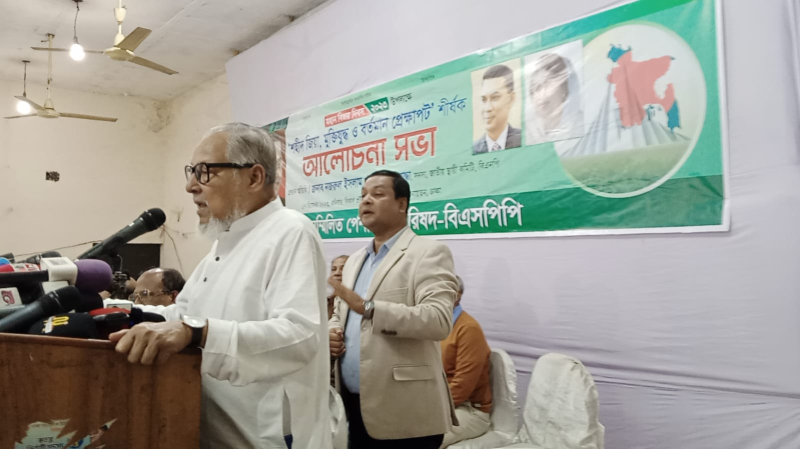- Multiple Arab states that host US assets targeted in Iran retaliation |
- Dhaka’s air quality 3rd worst in the world Sunday morning |
- Iran names 3-men body to cover transition as Khamenei’s dead |
- Iran warns ‘great crime’ will not go unanswered after Khamenei killed |
- Pak edge Lanka in high-scoring thriller: Both out of T20 World Cup |
The noncooperation movement of BNP, allies faces acid test

Nazrul Islam Khan, member, BNP standing committee addressing a rally in Dhaka.
The noncooperation movement being pursued by Bangkadesh's main opposition party, the BNP and its 61 allied parties since 20 December has been termed by observers as basically an awareness campaign to make the people start noncooperating with the government for not accepting their demand for free and fair elections under a nonpartisans government.
The immediate target is to refrain from going to polling stations and persuade the people to do so on January 7 slated for parliamentary elections across Bangladesh. Their argument is that the people's right to voting has been snatched and they can't be party to elections that would guarantee neither this right nor transparent and credible counting of votes.
They call the Jan 7 polls farcical as their results are by and large known even before the actual voting. As most political parties have boycotted elections organised without reforming the process; the ruling party has fielded, in addition to their official candidates, their party men to contest as independents with the intention of creating an election atmosphere to attract voters.
Mass contact programme by the Ganatantra Manch, a left political alliance allied with the BNP.
The ruling Awami league has resumed calling the BNP leaders and workers terrorists since October 28 when their grand rally in Dhaka was foiled in the mid way. The government accused the BNP workers of killing one policeman, attacking the police and journalists, setting fire to buses with a view to creating anarchy. The opposition charged the police and AL workers with attacking their rallies firing shots from guns and beating up opponents with bamboo sticks under a planned crack down.
The fresh spell of movement that followed with a general strike the next day and subsequently with blockade of roads, highways and waterways with 3 days of break on weekend days and Tuesday in the middle of the week has been marked by setting fire to more than buses and some trains which the government squarely blamed on the opposition. The opposition on the other hand said the fire incidents were preplanned by a section of law enforcers who worked along with AL men to taint their peaceful movement.
Meanwhile, as the Election Commission, that earlier complained of the absence of a congenial atmosphere for polls because of large rallies and demos organised by the BNP and its allies across Bangladesh, proceeded with an election schedule it announced on November 15, police continued to arrest BNP leaders and workers across the country and put them before courts. The lower courts worked overtime at nights and sentenced least 1500 leaders and workers to jails in arson, explosives and subversive cases.
BNP leaders have urged people to stop paying taxes and asked its leaders and workers not to appear in courts over false cases.
Political observers have said that by resorting to noncooperation the opposition has weakened their agitations so long organised through general strikes and blockades, as their present activities comprise mainly mass contacts and distribution of leaflets amid obstructions created by law enforcing agencies.
With this noncooperation has come bank as a political programme after 27 years. In 1996 the Awami league and its allies had called noncooperation against the then BNP government which was reelected in the February 15 election boycotted by all major political parties, an put pressure for making provisions for a non-partisan caretaker government to hold general elections. That BNP government passed a constitutional amendment (13th Amendment) making provisions for a caretaker government and called a fresh election on 12 June that unseated it.
Prior to that noncooperation was called in March 1971 by Bangabandhu Sheikh Mujibur Rahman when the Military government of the then Pakistan postponed a session of a Constituent Assembly, with clear signs to undo the massive verdict in favour of the Awami League to form government. That noncooperation movement ultimately transformed into the War of Liberation through which Bangladesh emerged as an independent nation.
Noncooperation as a political weapon was however first used in 1920 against the British rulers as they moved to curtail the participation of Indians in governance through the Government of India Act 1919 and gave unlimited power through the Rawlat Act of the same year for the police to make arrests. The political atmosphere had earlier been heated up by the massacre of peaceful protesters at a rally in Jallinwala Bagh in Punjab. The Khilafat movement started by Ali brothers and Moulana Abul Kalam Azad in 1919 to slavage the Turkish caliphate, got united with the noncooperation of Mahatma Gandhi on condition that it should be peaceful. However thr civil disobedience movement started in August 1920 was suspended when a mob turned violent and set fire to a police station in Chawri Chaura in UP killing 22 police personnel. A weakened Khelefat movement lost its relevance when the Turkish Sultan Mehmet V was deposed in 1922 and caliphate abolished two years later by Mustafa Kamal Ataturk.
Noncooperation is basically a political weapon to express no confidence in the government. Its effectiveness or otherwise in the present political context is expected to emerge during and after the January 7 election.

